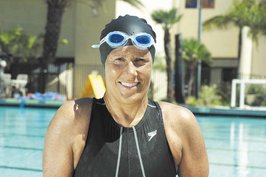It wasn’t a sting by the toxic box jellyfish — one of the most venomous animals in the ocean — that forced famed distance swimmer Diana Nyad to call off her third attempt to cross the 103 miles of open water from Cuba to Florida in September. It was a second potentially lethal sting.
After 40 hours in the water and covering 82 miles, the 62-year-old called off her third attempt; she had called off her second attempt in August after an 11-hour asthma attack and shoulder pain.
The openly lesbian Nyad, known also for her years of sports commentary and travel reporting on NPR, Fox and ABC, was recently in Philadelphia as part of GeoFest, an international food and film festival sponsored by the Geographical Society of Philadelphia, to talk about her swimming successes, setbacks — and when she’s going to attempt the swim again.
Nyad starting prepping for her recent efforts once she turned 60, noting that she started to reexamine her life after that milestone.
“I have, my whole life, been pressured by how little time we have, how quickly it all goes by. You know, you do something important — raise a child, pursue a study, do a career that you like — whatever you do, it takes a decade or two. And how many decades are there? You can barely count childhood … and you get into your 20s, your 30s, your 40s, your 50s, your 60s, and you say, What have I done?
“When I turned 60, I was just feeling like, wow, how have I spent the quality of my time?”
For Nyad, she isn’t questioning her accomplishments. In 1975, she set a distance record for swimming from Bimini, in the Bahamas, to Florida that still stands. The same year, she set a world record for circling Manhattan Island in 7:57 hours without a wetsuit. She was inducted into the National Women’s Hall of Fame in 1986 and into the International Swimming Hall of Fame in 2003.
After her early swimming successes, she pursued a career in sports and travel journalism and became known for her insightful commentaries and engaging storytelling.
Instead, Nyad is referring to what she calls “negative monkey chatter,” the ongoing self-doubt and criticism that ultimately prove unproductive for so many.
“I can’t beat myself up for being the person who’s been lounging around on the couch eating bonbons — that hasn’t been the issue,” she said. “It’s more that, like every adult woman I know, I’ve spent countless hours, which has added up into days and years, in negative monkey chatter — Why didn’t I stop the childhood sexual abuse? Why didn’t I save my marriage? — instead of just a quick, intelligent probing, an examination of the past, when you face up to maybe mistakes you made, and then you march on.”
So, when she turned 60, Nyad adopted the mantra “Onward” and set her sights on a difficult goal — “as something to dangle in front of me that would be so difficult and so challenging it would take every bit of me, my best self, every waking minute of every day” to attain.
“And there’s no other way to get it done. There is no time for existential meandering about why you couldn’t do it better. It almost didn’t matter whether it was the swim or something else.
“It’s just gotten under my skin now; it’s not even a sporting event. It’s like it’s something I just don’t want to give up.”
And a difficult endeavor it is. In preparation for the swim next July, when the waters are warm enough, she’ll start her serious training in January, undertaking eight-hour swims and progressing to 24-hour swims.
By April, she’ll be doing four 10-14-hour swims a week, with a day off in-between to recuperate: gain some weight back, allow her skin to heal from the salt-water abrasions, hypothermia and stomach difficulties.
The vigorous training schedule builds both physical strength and mental stamina — the discipline to keep going.
“You just decide what you are going to do and you don’t quit. The mental comes with the physical. You start putting in all those long swims … the body and shoulders start getting strong, the strokes start getting way up on top of the water, and then your brain is getting stronger too because you are confident — you know what you can do.”
But for Nyad, distance swimming is more than just a physical feat, or even mental toughness.
“There are moments when you feel the sea, you feel the tidal pull,” she said. “I’m not religious, but I’m in awe of this planet. When you are out there in that vast ocean, it’s the middle of the night and you are feeling the tide, and you are being tugged by the current and look up at the billions of stars — you are in a sense of sensory deprivation and you are tired; the mind gravitates more easily to these subjects — and it’s a high.”
Sarah Blazucki can be reached at [email protected].
